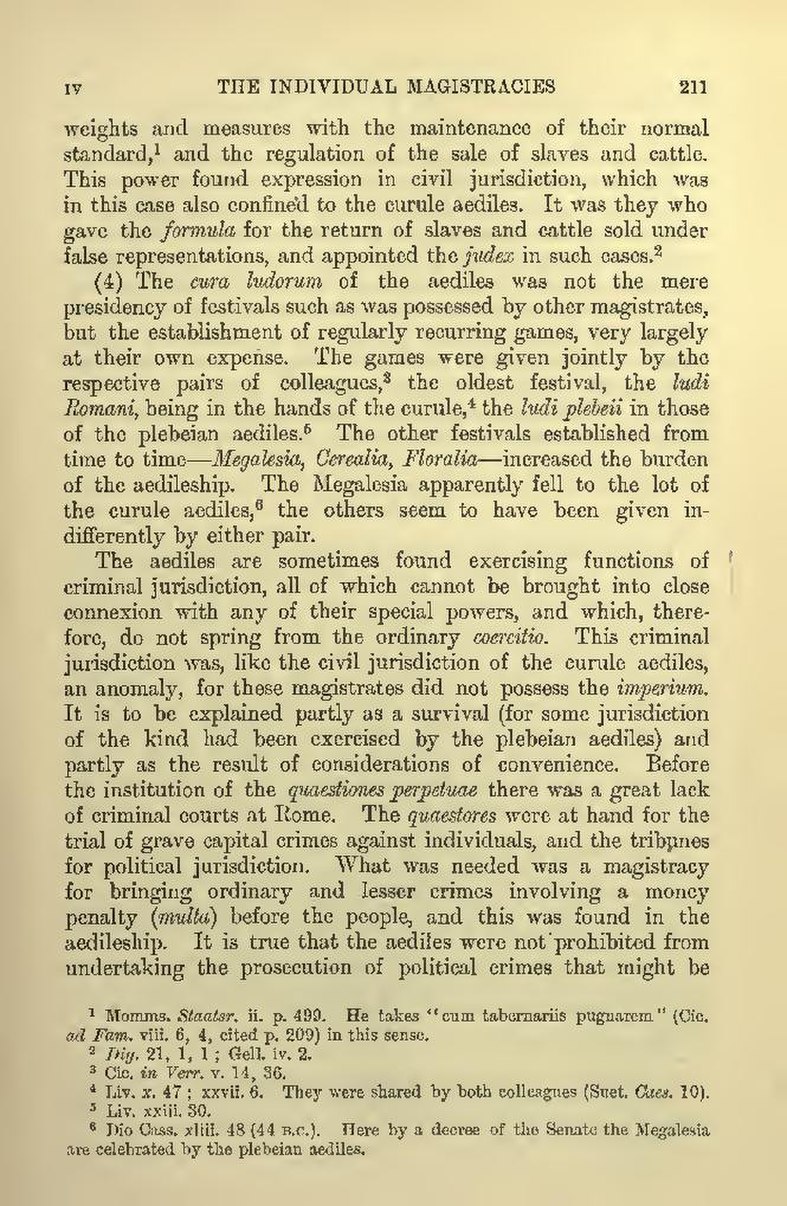weights and measures with the maintenance of their normal standard,[1] and the regulation of the sale of slaves and cattle. This power found expression in civil jurisdiction, which was in this case also confined to the curule aediles. It was they who gave the formula for the return of slaves and cattle sold under false representations, and appointed the judex in such cases.[2]
(4) The cura ludorum of the aediles was not the mere presidency of festivals such as was possessed by other magistrates, but the establishment of regularly recurring games, very largely at their own expense. The games were given jointly by the respective pairs of colleagues,[3] the oldest festival, the ludi Romani, being in the hands of the curule,[4] the ludi plebeii in those of the plebeian aediles.[5] The other festivals established from time to time—Megalesia, Cerealia, Floralia—increased the burden of the aedileship. The Megalesia apparently fell to the lot of the curule aediles,[6] the others seem to have been given indifferently by either pair.
The aediles are sometimes found exercising functions of criminal jurisdiction, all of which cannot be brought into close connexion with any of their special powers, and which, therefore, do not spring from the ordinary coercitio. This criminal jurisdiction was, like the civil jurisdiction of the curule aediles, an anomaly, for these magistrates did not possess the imperium. It is to be explained partly as a survival (for some jurisdiction of the kind had been exercised by the plebeian aediles) and partly as the result of considerations of convenience. Before the institution of the quaestiones perpetuae there was a great lack of criminal courts at Rome. The quaestores were at hand for the trial of grave capital crimes against individuals, and the tribunes for political jurisdiction. What was needed was a magistracy for bringing ordinary and lesser crimes involving a money penalty (multa) before the people, and this was found in the aedileship. It is true that the aediles were not prohibited from undertaking the prosecution of political crimes that might be
- ↑ Momms. Staatsr. ii. p. 499. He takes "cum tabernariis pugnarem" (Cic. ad Fam. viii. 6, 4, cited p. 209) in this sense.
- ↑ Dig. 21, 1, 1; Gell. iv. 2.
- ↑ Cic. in Verr. v. 14, 36.
- ↑ Liv. x. 47; xxvii. 6. They were shared by both colleagues (Suet. Caes. 10).
- ↑ Liv. xxiii. 30.
- ↑ Dio Cass. xliii. 48 (44 B.C.). Here by a decree of the Senate the Megalesia are celebrated by the plebeian aediles.
